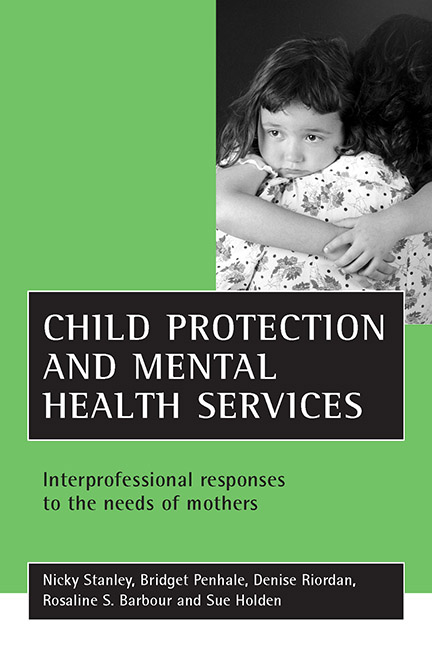Book contents
- Frontmatter
- Contents
- List of tables and figures
- Introduction
- one Mental health needs and mothering
- two The service context
- three Interprofessional work
- four The research study
- five Identifying key research issues
- six Mothers’ perspectives
- seven The mothers’ evaluations of professional support
- eight The professionals and their practice
- nine Conceptualising needs and evaluating risk
- ten Interprofessional communication and coordination
- eleven Identifying appropriate resources
- twelve Conclusion
- References
- Index
- Also available from The Policy Press
eleven - Identifying appropriate resources
Published online by Cambridge University Press: 20 January 2022
- Frontmatter
- Contents
- List of tables and figures
- Introduction
- one Mental health needs and mothering
- two The service context
- three Interprofessional work
- four The research study
- five Identifying key research issues
- six Mothers’ perspectives
- seven The mothers’ evaluations of professional support
- eight The professionals and their practice
- nine Conceptualising needs and evaluating risk
- ten Interprofessional communication and coordination
- eleven Identifying appropriate resources
- twelve Conclusion
- References
- Index
- Also available from The Policy Press
Summary
The availability of appropriate resources will be a key factor in developing an effective response to families’ needs. In mental health services, staff time and skills are essential components of the service but are often in short supply (DoH, 2000a). Services need to be relevant and appropriate, but what constitutes a user-friendly service for one group may not succeed in meeting the needs of others. Targeting services on the specific needs of certain groups of service users is likely to increase the extent to which particular groups experience such agencies as relevant and responsive. However, this may also have the effect of limiting the potential user group for such services. These services in the mental health field might include specialist therapies, support groups for service users with needs or problems in common, training or educational programmes and domiciliary services, which aim to assist individuals with domestic and practical tasks as well as develop users’ skills. There are few examples of services that are focused directly on parents with mental health needs. Where such services do exist, they are likely to be provided by the voluntary sector. The New Parent Information Network (NEWPIN), a voluntary organisation which provides support for parents with mental health needs (Cox et al, 1991; Cox, 1993), is probably the best-known example of such a service in the UK, but none of the research sites in this study could boast such a resource. Since mental health needs fluctuate over time, services need to be speedily accessed when they are needed, with the possibility that they can be withdrawn or reduced in intensity when levels of mental health need subside.
Practitioner time is an equally important resource in child care services; Chapter Eight of this book reported the difficulties experienced by child care social workers in offering mothers adequate opportunities for ‘active listening’. Other relevant resources include those focused on strengthening or reinforcing parenting skills: these might include support groups for parents and voluntary sector services such as Home Start. The provision of good-quality childcare is a key but rationed service that is much valued by families (Statham et al, 2001). Likewise, respite care for children at times of family crisis or illness can be a key factor in keeping families intact.
- Type
- Chapter
- Information
- Child Protection and Mental Health ServicesInterprofessional Responses to the Needs of Mothers, pp. 103 - 112Publisher: Bristol University PressPrint publication year: 2003



